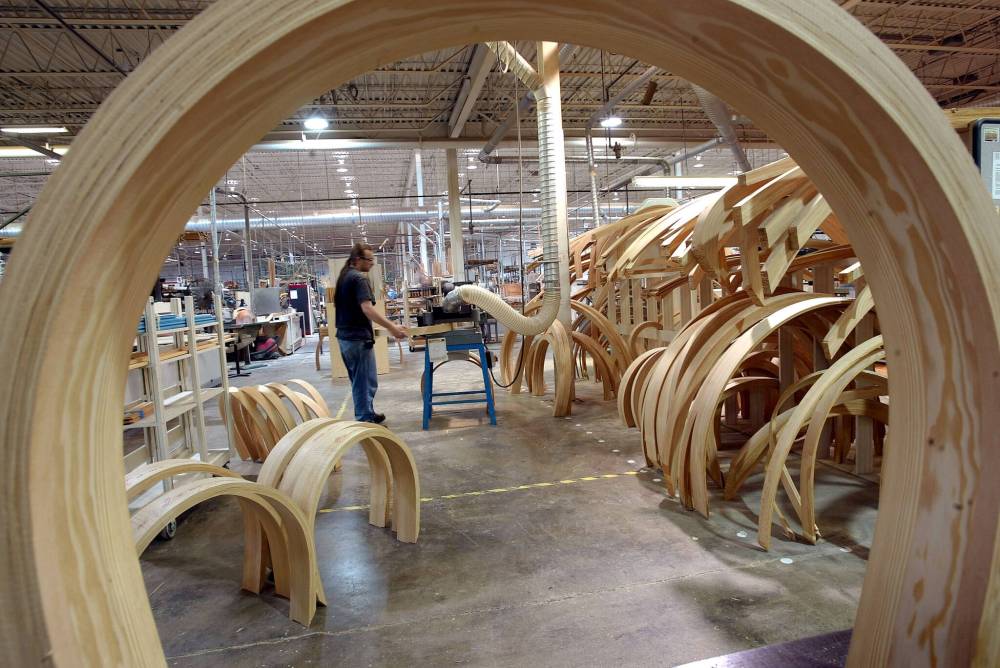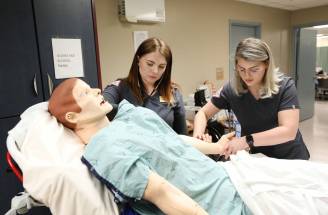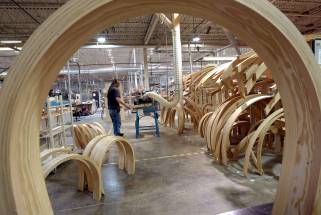Manufacturers leave $13 billion on the table Labour shortages, late fees and delayed capital investments taking huge toll on Canadian economy: report
Read this article for free:
or
Already have an account? Log in here »
To continue reading, please subscribe:
Monthly Digital Subscription
$0 for the first 4 weeks*
- Enjoy unlimited reading on winnipegfreepress.com
- Read the E-Edition, our digital replica newspaper
- Access News Break, our award-winning app
- Play interactive puzzles
*No charge for 4 weeks then price increases to the regular rate of $19.00 plus GST every four weeks. Offer available to new and qualified returning subscribers only. Cancel any time.
Monthly Digital Subscription
$4.75/week*
- Enjoy unlimited reading on winnipegfreepress.com
- Read the E-Edition, our digital replica newspaper
- Access News Break, our award-winning app
- Play interactive puzzles
*Billed as $19 plus GST every four weeks. Cancel any time.
To continue reading, please subscribe:
Add Free Press access to your Brandon Sun subscription for only an additional
$1 for the first 4 weeks*
*Your next subscription payment will increase by $1.00 and you will be charged $16.99 plus GST for four weeks. After four weeks, your payment will increase to $23.99 plus GST every four weeks.
Read unlimited articles for free today:
or
Already have an account? Log in here »
Hey there, time traveller!
This article was published 25/10/2022 (1139 days ago), so information in it may no longer be current.
The Canadian Manufacturers and Exporters (CME) has put a number on all the hand-wringing going on about workers shortages — $13 billion.
That’s how much the current labour shortages is costing the industry across the country — in the last year alone. The CME came to that total extrapolating from a recent survey of its members on labour force issues.
It comes from lost orders because companies don’t have the workforce capacity to take on more work and from costs that have to be paid because of orders that are shipped late — again because of worker shortages — which totals about $7.2 billion.
Then there’s $5.4 billion from postponed or cancelled capital investment not made because of respective workforce shortages.
For the second year in a row, 82 per cent of respondents to the survey — 563 manufacturers from small to huge companies across the country — said they were facing labour and/or skills shortages. Only 39 per cent answered in the affirmative in 2016 and 69 per cent in 2018.
Todd LeRoy, vice-president of manufacturing at Loewen Windows in Steinbach, says he’s been looking to hire 30 people every month for the past two years.Todd LeRoy, vice-president of manufacturing at Loewen Windows in Steinbach, said “We have been looking to hire 30 people every month for the past two years.”
The company has a total of about 750 employees and has hired 200 this year.
LeRoy puts some of it down to the fact that there are a lot of job opportunities out there which give young people the chance to be selective until they find the job they really want to commit to.
At the organization’s annual meeting in Toronto on Tuesday, Dennis Darby its president and CEO, reminded people that the industry was facing a labour shortage before the beginning of the pandemic which dramatically reduced the number of newcomers to Canada, traditionally an important source of labour for manufacturers.
“We need 500,000 economic immigrants per year to rebuild our labour force,” said Darby.
Respondents said that immigration and enhanced education and skills training are needed to address the now chronic and expensive problem.
Darby said that it is an issue that requires an all-of-government effort to deal with.
“We need 500,000 economic immigrants per year to rebuild our labour force.”–Dennis Darby
And while it may not be an obvious solution, when asked how government could best help the situation, the most popular suggestion was to provide more support to encourage automation.
Not only does automation increase productivity — an area that Canada has been lagging in for years — but it can alleviate some of the need for unskilled workers and create a whole new class of perhaps more attractive employment opportunities for people who might have avoided manufacturing in the past because of its legacy image as an unpleasant work environment.
Jill Knaggs, an official with CME Manitoba, said there is no reason to think that Manitoba manufacturers are not bearing a proportionate share of that $13 billion that’s been left on the table this past year because of worker shortages.
“It has been the number one concern for our members for a few years now,” she said.
Knaggs said in Manitoba enhanced immigration is seen as an important measure to deal with the long-standing problem for the sector. CME Manitoba’s director of workforce development in on the province’s newly formed Immigration Advisory Council that’s co-chaired by Lloyd Axworthy.
JEFF DE BOOY / WINNIPEG FREE PRESS FILE
Knaggs said, “The percentage of workers from other other countries needs to increase.”
LeRoy agreed that immigrant workers at Loewen are a key component in its efforts to get staffed up. For instance, close to 20 recent immigrants from Ukraine are working at Loewen. He praised the community support that exists for the newcomers in Steinbach but believes assistance in covering the costs of English language training would be a welcome support from government.
The CME’s chief economist Alan Arcand said in the report that two factors are combining to create the shortage: an aging cohort of baby boomers retiring in waves, and a lack of interest in manufacturing jobs from young Canadians.
One of the biggest barriers companies reported was a difficulty finding workers with the right technical skills — the shortages are hitting the hardest in skilled production jobs, such as welders, machinists and industrial mechanics. Companies are also having trouble filling positions in general labour or production, and supervisory or management roles.
Darby is concerned the shortages, especially of skilled labour, are becoming chronic, and that the issue can’t be fixed overnight as it takes time to learn a trade.
“The pipeline of new entrants has been really, really slow through the pandemic.”–Dennis Darby
“The pipeline of new entrants has been really, really slow through the pandemic,” said Darby.
He said the sector needs to hire more underrepresented groups, such as women, people of colour, Indigenous people and newcomers.
To attract and retain workers, more than 70 per cent of those surveyed said they are increasing wages and benefits. However, they’re also looking to the government to help, by supporting automation, promoting the trades, and increasing immigration.
CME are also asking the government to increase the Canada Job Grant and make it permanent, provide tax credits to offset employee training costs and equipment purchases, and speed up the temporary foreign worker program.
CME represents more than 2,500 companies across Canada, most of which are small and medium-sized businesses.
martin.cash@freepress.mb.ca
— with files from CP

Martin Cash has been writing a column and business news at the Free Press since 1989. Over those years he’s written through a number of business cycles and the rise and fall (and rise) in fortunes of many local businesses.
Our newsroom depends on a growing audience of readers to power our journalism. If you are not a paid reader, please consider becoming a subscriber.
Our newsroom depends on its audience of readers to power our journalism. Thank you for your support.







